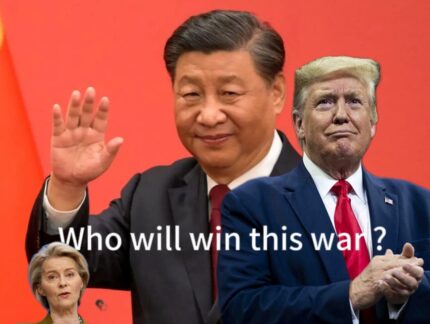The global economy is bracing for significant upheaval following former U.S. President Donald Trump’s announcement of sweeping tariffs on all imports, with even higher rates for what he calls “worst offenders.” The move has drawn sharp criticism from the European Union, which has labeled it a “major blow to the world economy.” In response, China has vowed to retaliate, setting the stage for a renewed global trade war.
Trump’s tariffs are designed on a sliding scale based on the U.S. trade deficit with each country, rather than the actual tariffs those nations impose. The Trump administration argues that these measures will boost domestic manufacturing, create jobs, and generate revenue. However, economists warn that history has shown trade wars often lead to increased consumer prices, reduced market choices, and economic instability.
European Leaders Condemn Trump New Tariffs, Prepare Retaliatory Measures
The European Union has swiftly condemned the tariffs, with European Commission President Ursula von der Leyen warning of “dire consequences for millions worldwide.” France, Germany, and Italy have all expressed concerns about the economic fallout, with French President Emmanuel Macron calling an emergency meeting of business leaders to assess the impact.
Sophie Primas, a spokeswoman for the French government, has emphasized the EU’s readiness for a trade war. “The union must be strong and united in response to these Trump tariffs,” she stated. The EU’s initial countermeasures will focus on a 25% tariff on American aluminum and steel, with further restrictions on major U.S. industries, including technology giants like Meta, Google, Microsoft, and Apple, under discussion.
Stock Markets Plunge Amid Growing Trade Uncertainty
Stock markets across Europe reacted negatively to Trump’s announcement, with major indices plummeting. The FTSE 100 and CAC 40 both dropped by more than 1.5%, while Germany’s DAX index suffered the most significant decline at over 2%. Germany, home to a robust automotive industry, is particularly vulnerable to these tariffs, with industry leaders warning of potential job losses and reduced economic growth.
Jérôme Bauer, head of a leading French wine organization, has projected a net loss of €1 billion to France’s wine and spirits industry due to the tariffs. The economic uncertainty surrounding these measures has forced several European businesses to reconsider their export strategies and contingency plans.
Hungary Breaks Ranks, Blames EU Leadership for Trade Dispute
While most European leaders have condemned Trump’s move, Hungary has taken a different stance. Hungarian Foreign Minister Peter Szijjarto criticized EU leadership, accusing Brussels of “Trump-phobia” and incompetence in handling trade relations with the U.S. He suggested that Europe should have reduced its own tariffs to create a stronger negotiating position rather than escalating tensions.
Szijjarto called on the EU Commission to engage in urgent negotiations with the U.S. to prevent further economic damage. His remarks highlight divisions within the EU on how to respond to the crisis, with some nations advocating a hardline approach while others seek a diplomatic resolution.
Path Forward: EU Seeks Talks, but China Prepares for Retaliation
The European Parliament’s Committee on International Trade, chaired by Bernd Lange, has announced plans to begin negotiations among EU member states next week to formulate a collective response. Lange will travel to Washington in April to discuss potential solutions with White House officials.
Meanwhile, China has vowed to retaliate against the U.S. tariffs, further escalating tensions. Beijing has hinted at imposing its own set of trade restrictions on American goods, particularly targeting agricultural products and high-tech industries. With both economic superpowers on a collision course, global markets face a period of uncertainty and volatility.
The unfolding trade dispute underscores the complexities of global commerce and the risks associated with protectionist policies. As the EU, China, and the Trump administration brace for further economic skirmishes, consumers and businesses worldwide are likely to bear the brunt of the fallout.














